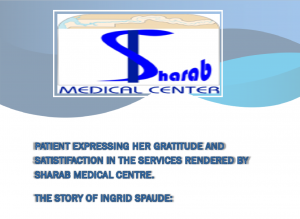Patient Stories
At SHARAB we believe our patients are our best advocates. Over 90% of our patients come to us through word of mouth. This says a lot about the quality of care at SHARAB. Since its inception, SHARAB has been overwhelmed by the feedback from our patients.
We have made it our goal to provide the highest quality of care to our patients every day. Our stories and the differences we have made to their lives are best described by the patients themselves. Through their stories, you will get an overview of SHARAB’s mission and goals of life-changing health care available for ordinary Gambians and other nationals.
INGRID SPAUDE
Ingrid Spaude’s blissful retirement was disrupted when she developed severe bouts of pain in her tummy. Like many from Europe, Ingrid chose to settle in The Gambia after her retirement. At 66, the fresh air, sunny beaches, and lovely people in the smallest inland country in Africa offered the much-needed relaxation.
She had enjoyed a healthy stay for the past 11 years in the country and did not think much of the mild discomfort in her tummy and pain while passing water. This however progressed to excruciating pain that prevented her from doing her daily activities. After a series of visits to different clinics and several courses of medications, Ingrid lost hope and was surviving on painkillers.
“As soon as I heard him talk, I said to myself, this is the person I have been waiting to see”
This was what Ingrid said to herself when she coincidentally came across a health talk on the local television channel by SHARAB Urologist Dr. Abubacarr Jah.
An ultrasound scan at SHARAB revealed ‘suspicious’ multiple cysts in her right kidney. A CT scan subsequently confirmed the diagnosis of multiple cysts and also revealed a kidney stone. She was informed of the Bosniak Classification, a system that is used to grade kidney cysts based on their appearance on a CT scan. This system assists Urologists to predict which cysts are more likely to have kidney cancer inside them. According to the classification, Ingrid’s kidney cysts were at least grade II. This means that there was a chance of 5% (if II) to 50% (if III) of being cancerous.
Ingrid was informed of her grade and given the option of kidney stenting to deal with the pain and further investigations to confirm the nature of the cysts and plan for stone definitive treatment. She however was very keen to have a nephrectomy to avoid a prolonged and expensive investigation and treatment, which may end up in a nephrectomy anyway….“I just wanted my kidney out”.
The indication for nephrectomy depends on several factors including the degree of suspicion (Bosniak Score), state of the other kidney, and age of the patient. In Ingrid’s case, the indications include; the occurrence of multiple complex cysts, symptomatic kidney stone, normal contralateral kidney, and patient’s choice.
An informed consent was obtained for the procedure and on 19th September 2012, nearly one year after the first onset of symptoms, Ingrid had surgery for the removal of her left kidney. The next day she was able to walk up a flight of stairs unaided to SHARAB private wing.
“It is just unbelievable! None of my friends from Germany believe that this treatment option is available in The Gambia”.
Comparing her treatment at SHARAB to that of Germany… “ It is the same or even better” …she says. “SHARAB staff are just so caring and friendly”. “I felt like I had known them for several years and I was 100 percent confident that I would get the best care as soon as I entered the hospital.”
Ingrid was discharged home five days after her surgery and is currently awaiting histology reports.


